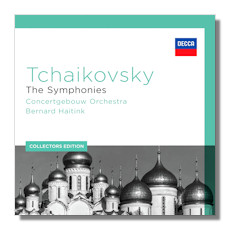
The Internet's Premier Classical Music Source
Related Links
- Tchaikovsky Reviews
- Latest Reviews
- More Reviews
-
By Composer
-
Collections
DVD & Blu-ray
Books
Concert Reviews
Articles/Interviews
Software
Audio
Search Amazon
Recommended Links
Site News
 CD Review
CD Review
Piotr Ilyitch Tchaikovsky

The Symphonies
- Symphony #1 in G minor "Winter Daydreams", Op. 13 (1874)
- Symphony #2 in C minor "Little Russian", Op. 17 (1872)
- Symphony #3 in D Major "Polish", Op. 29 (1875)
- Symphony #4 in F minor, Op. 36 (1878)
- Symphony #5 in E minor, Op. 64 (1888)
- Symphony #6 in B minor "Pathétique", Op. 74 (1893)
- Symphony in B minor "Manfred", Op. 58 (1884)
- Symphonic Fantasy "Francesca Da Rimini" in E minor, Op. 32 (1876)
- Capriccio Italien in A Major, Op. 45 (1880)
- Fantasy Overture in B minor "Roméo & Juliet" (1869)
- Marche Slav in B Flat Major, Op. 31 (1876)
- Overture solennelle "1812" in E Flat Major, Op. 49 (1880)
- Overture "The Storm" in E minor, Op. posth. 76 (1864)
Concertgebouw Orchestra/Bernard Haitink
Decca Collectors Edition 4785867
Tchaikovsky is one of those composers that people like because it's "pretty" music. And it really, truly is that. Herbert von Karajan understood that better than anybody. Rather than try to emulate the great Russian performances, with their high-strung neurotic tension and blazing intensity, Karajan simply leaned on his Berlin (and sometimes Vienna and Paris) forces to make lovely sounds. Bernard Haitink is of the same mind. These aren't the hottest performances around, nor the most probing. They are breathtakingly played, though, and I doubt anyone stumbling upon them could really be too upset.
That's not to say that Haitink (or Karajan, for that matter) can't supply the necessary power to elevate these works to the masterpieces they are. Far from it, in fact. But so glorious is the string tone, so luminous the winds and brass, that it is unlikely that you'll come away complaining about the occasional underplayed moment here and there. Indeed, the chief asset of this very generous box is the playing of the Concertgebouw, beyond reproach in every respect. And Haitink doesn't just beat time; he's fully in command and pours a good deal of energy into lesser-known works like the early symphonies or The Storm. More than Karajan in Berlin, Haitink understands the need for winds and brass in addition to strings. By that I mean that – beautiful as they are – even Karajan's finest performances often suffered from overbearing strings and consistently stifled secondary sections. Haitink doesn't ever have this problem. The brass are confidently bold, not to mention recorded in warmly natural sound.
Is everything of equal value? Of course not. I've gone out of my way to avoid a bad recording of the 1812 Overture, but this one comes with the package. It's lovely-sounding, but generally very dull. The final pages are nearly unrecognizable in their almost total lack of bombast, although the playing (especially in the brass) is almost unfairly warm. It's simply the wrong work for that. The Capriccio italien also features some majestic brass chorales, but is also somewhat more involved as an interpretation. The music does manage to ignite at end here. The remaining tone poems follow this pattern; Marche slave is very boring, while Francesca and The Storm are surprisingly excellent. Many of the tone poems were recorded very early in the conductor's relationship with the orchestra, so perhaps the uneven quality has to do with these forces getting comfortable with each other.
But more often than not, you're struck by what a fine overall achievement this is. Why it's been mostly invisible since its CD release in 1994 is frankly beyond me. Yes, neither the finales of Symphony #4 or #5 are the most visceral, but they are plenty exciting and feature some really magnificent orchestral work. The Manfred is one of the better ones around, not matching Muti on EMI/Warner/Brilliant Classics, but audibly superior to most. The early symphonies are convincing and even important in Haitink's capable hands. The sound, originally from Philips, is fully worthy of the accolades piled upon it at the original release. Part of Universal's revamped "Collectors Edition", I am more than happy to welcome these recordings back.
Copyright © 2014, Brian Wigman


















